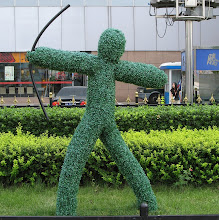
"Semanticist S.I. Hayakawa discussed the idea of an abstraction ladder in which language starts on the ground, so to speak, with an object available to our sense of perception, and moves up to concepts abstracted from, derived from, the concrete source-for example, from a specific cow to livestock to farm assets to assets. He stressed that our powers of abstraction are indispensable. 'The ability to climb to higher and higher levels of abstraction is a distinctively human trait without which none of our philosophical or scientific insights would be possible.' But he cautioned against staying at too high a level of abstraction. "
This passage, from Writing Logically Thinking Critically, reminds me of the importance of richness of personal experience. I used to be very confident of how to lead my life, a little overconfident I think, because I once thought that all the necessary knowledge of life are criteria, such as being honest, being brave, being kind to the old and so on. But as I grow up, I find that if I have not my own experience, those criteria alone are empty. For example, take honesty. It is easy to say I will be honesty to everyone, but sometimes other factors may be more important, like the happiness of patience. More recently, I find I may lie to someone simply because I am tired of explaining again and again what my department is in my home university because in NUS, there is no correspondent department. It is through specific experience that I realize that those criteria alone do not provide reasons strong enough for my action. They may be right, but are so abstracted that they prevents me from fully comprehend what they really mean.
By the way, J.S. Mill also warns that "an opinion of on a point of conduct, not supported by reasons, can only count as one person's preference", which means more of less the same thing.

No comments:
Post a Comment